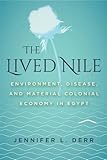The lived Nile : environment, disease, and material colonial economy in Egypt / Jennifer L. Derr.
Material type: TextPublisher: Stanford, California : Stanford University Press, [2019]Description: 1 online resource (xi, 244 pages) : illustrations, mapsContent type:
TextPublisher: Stanford, California : Stanford University Press, [2019]Description: 1 online resource (xi, 244 pages) : illustrations, mapsContent type: - text
- computer
- online resource
- 9781503609662
- 1503609669
- Naučno-Issledovatelʹskij Institut Ugrovedenija
- Nile River -- History
- Aswan Dam (Egypt) -- History
- River engineering -- Egypt -- History
- Irrigation engineering -- Egypt -- History
- Dams -- Environmental aspects -- Egypt -- History
- Irrigation farming -- Health aspects -- Egypt -- History
- Agriculture -- Economic aspects -- Egypt -- History
- Egypt -- History -- British occupation, 1882-1936
- Nil (Fleuve) -- Histoire
- Barrage d'Assouan (Égypte) -- Histoire
- Technologie fluviale -- Égypte -- Histoire
- Technique de l'irrigation -- Égypte -- Histoire
- Barrages -- Aspect de l'environnement -- Égypte -- Histoire
- Agriculture -- Aspect économique -- Égypte -- Histoire
- Égypte -- Histoire -- 1882-1936 (Occupation britannique)
- Agriculture -- Economic aspects
- Dams -- Environmental aspects
- Irrigation engineering
- Irrigation farming -- Health aspects
- River engineering
- Egypt
- Egypt -- Aswan Dam
- Nile River
- Bewässerung
- Kolonialismus
- Landwirtschaft
- Ägypten
- Assuan-Hochdamm
- British Occupation of Egypt (Egypt : 1882-1936)
- 1882-1936
- 962/.04 23
- DT116 .D48 2019eb
| Item type | Home library | Collection | Call number | Materials specified | Status | Date due | Barcode | |
|---|---|---|---|---|---|---|---|---|
 Electronic-Books
Electronic-Books
|
OPJGU Sonepat- Campus | E-Books EBSCO | Available |
Includes bibliographical references (pages 207-229) and index.
Introduction : a river, remade : making subjects on the perennial Nile -- Nile articulations : decolonizing the history of irrigation engineering -- The dammed Nile : the thirty-year project to build Khazan Aswan -- Beyond the frontier : negotiating the geography of authority in Egypt's south -- Cruel summer : environmental labors and the scales of subject making -- Treated subjects : irrigating the veins of the nation -- Conclusion : the afterlives of the perennial subject.
In October 1902, the reservoir of the first Aswan Dam filled, and Egypt's relationship with the Nile River forever changed. Flooding villages of historical northern Nubia and filling the irrigation canals that flowed from the river, the perennial Nile not only reshaped agriculture and the environment, but also Egypt's colonial economy and forms of subjectivity. Jennifer L. Derr follows the engineers, capitalists, political authorities, and laborers who built a new Nile River through the nineteenth and early twentieth centuries. The river helped to shape the future of technocratic knowledge, and the bodies of those who inhabited rural communities were transformed through the environmental intimacies of their daily lives. At the root of this investigation lies the notion that the Nile is not a singular entity, but a realm of practice and a set of temporally, spatially, and materially specific relations that structured experiences of colonial economy. From the microscopic to the regional, the local to the imperial, The Lived Nile recounts the history and centrality of the environment to questions of politics, knowledge, and the lived experience of the human body itself.-- Provided by publisher.
Print version record.
eBooks on EBSCOhost EBSCO eBook Subscription Academic Collection - Worldwide
There are no comments on this title.

